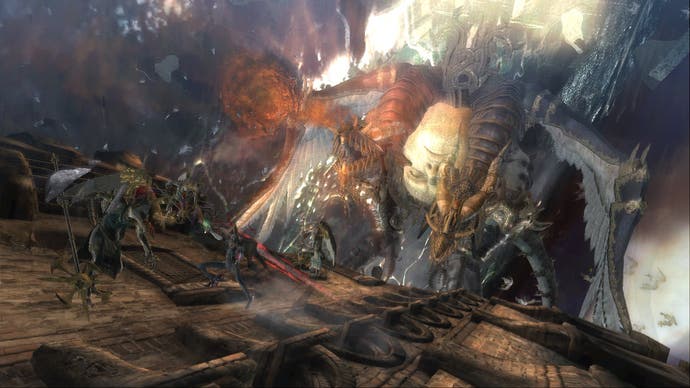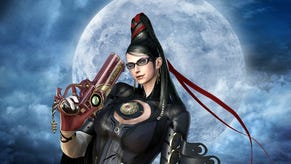Bayonetta
Angel May Cry.
However, it's in combat that Bayonetta's splendour is fully revealed. The emphasis is on stringing together attacks, both ranged and melee, into giant, unbroken chains. Strip away the fury and spectacle and it works a little like Batman: Arkham Asylum's combo system, in that it's entirely possible for a skilled player to clear an area of opponents without taking damage or dropping the combo. Where the two games diverge is in Bayonetta's gigantic library of potential moves, the majority of which are unlocked to you right from the off. With four slots for weaponry (a piece in each hand and one tied to each foot), and separate move-lists for each type, the scope for unique play styles is dizzying.
To help you find your way through the labyrinthine move lists, Platinum delivers one of the smartest loading screens yet. While the next level's assets are loading in, you take control of the bespectacled witch in an abstract training space, free to pull off any move in her unlocked repertoire. On the right side of the screen a shopping list of Bayonetta's moves is displayed, each with a number next to it indicating how many times you have executed that move.
This plays on our natural inclination to catch 'em all, turning the very act of practicing into a mini-game. Moreover, as you string together different balletic moves, you absorb new techniques and approaches into your style. The next level automatically begins when loaded in, but by pressing the 'back' button you can choose to delay progression and simply play around in this space for a while. It's ingenious.
Bullets are the glue that links together your melee combos, every close encounter with an angel or seraphim strung together by a hail of pistol fire to keep the numbers rising. Dodge an enemy attack at the last moment and the game will temporarily slip into Witch Time, the screen doused in purple and all enemies reduced to extreme slow motion. Chain enough enemies together during the course of a battle and you earn magic points that can be used to summon forth torture equipment, such as giant chainsaws and opaque guillotines, devices that can be inserted into combos for additional points and exhibition. As fodder for YouTube showboating, few games rival Bayonetta.

For all this visual excitement, this is a game driven primarily by its narrative. Exploration has been reduced to a lean minimum, and puzzles are generally simple reaction-based challenges, requiring you to, for example, dodge a bolt of lightening to trigger Witch Time, in order to run through spurts of lava.
More often, each short cut-scene is followed by an encounter with multiple enemies in a locked-off area. These micro-fights are each scored and graded, the ultimate prize being a 'Pure Platinum' medal for those who manage an unbroken combo without taking a single hit. This rolling rhythm can be interrupted by trips to the Gates of Hell, Bayonetta's local bar, where she can upgrade weapons and purchase new moves, but generally every building block of the experience is sized and segued to prevent boredom and promote pace.
With two tiers of 'easy' level to play at, Bayonetta is welcoming to newcomers, who will be able to perform impressive strings of attacks simply by mixing up button inputs. Play the game at Normal difficulty or higher, however, and every move will need to be carefully timed, especially during the protracted boss fights, some of which make up entire chapters of the game. With scored leaderboards for almost every level, the firm emphasis is on competition, and at high-level play, Bayonetta demands mastery before victory.
The result is a game that exemplifies so much of what commentators claim has died in the Japanese game industry. A blast of creative brilliance, both technically accomplished, strategically deep and infused with rare imagination, Bayonetta represents the pinnacle of its chosen niche.
This is a review of the Japanese Xbox 360 version of Bayonetta, which is out now. The PS3 version is a port, and Digital Foundry will be looking at the differences soon. Bayonetta is due out in Europe on 8th January for both formats.















